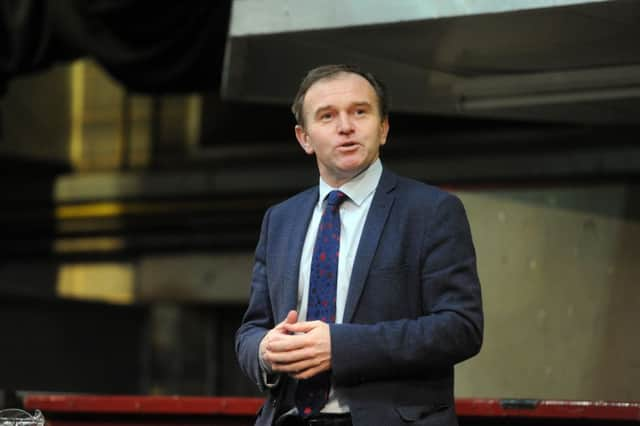'˜If we got Brexit campaign wrong, we wouldn't get another chance': Defra minister George Eustice talks to The Yorkshire Post


The role of Minister for Farming and Fisheries is arguably not regarded as the most glamorous or highly sought-after position in Government.
And yet, as the recent rows over chlorinated chicken imports and soaring food prices have revealed, it is an area that will be of critical importance in the pre- and post-Brexit landscape.
Advertisement
Hide AdAdvertisement
Hide AdWhen last year’s referendum was announced, George Eustice was among the first to confirm his allegiance to the Leave camp.
This came as no surprise to the many who were aware that the Cornish MP’s first foray into politics was as a Ukip candidate in the 1999 European elections. But speaking to The Yorkshire Post he claims it was a tough decision – made harder by the prospect of defying his friend and leader, David Cameron.
“It was a difficult conversation that I had to have,” he says.
“I had hoped during the October of 2015 that we as a government would have set out an ambitious plan for renegotiation.... but it became very clear around that time that [David Cameron] really just wanted to get the referendum out the way and wasn’t very confident he could get much in the negotiation.
Advertisement
Hide AdAdvertisement
Hide Ad“In December 2015 he asked me whether I would help run the Remain campaign.
“It was a difficult for me because I felt a huge amount of personal loyalty to David and had been there from the start. But also I was conscious this was a once-in-a-generation decision, and if we got it wrong, we wouldn’t get another chance.”
Mr Eustice first encountered David Cameron when the pair were working on the party’s 2005 election campaign. He had been asked to come on board as head of press by the then-leader Michael Howard, while Cameron was tasked with drawing up the manifesto.
The 45-year-old remembers being impressed by the new MP’s “good judgement” at the time, and when he was approached to help out on his bid to replace Howard at the Conservative Party helm, he agreed. “I was involved it the first speech he did back in June 2005 when he was setting out his vision of modern compassionate conservatism, and I just thought that he had identified what the Conservative Party needed to become in order to make itself relevant again,” he explains.
Advertisement
Hide AdAdvertisement
Hide Ad“The other crucial thing for me was that Oliver Letwin backed David Cameron, and I have always been a huge supporter of Oliver so was quite influenced by the fact [he] had gone that way.
“And it was just quite an exciting opportunity.”
Also involved in that leadership campaign was the recently elected MP for Surrey Heath, Michael Gove. Mr Eustice was already well acquainted with the MP from his time as head of press for the No to the Euro campaign – a period when Gove was working for The Times newspaper.
As a “like-minded” eurosceptic, Mr Eustice claims Mr Gove would often be invited to campaign strategy meetings, with the group using him “as a sounding board”.
The two have since campaigned alongside each other on the EU referendum, on Mr Gove’s own leadership bid in 2016, and – following Mr Gove’s appointment as the new Defra Secretary – they are now working together to deliver a Brexit that works for British farmers and fishermen. Mr Eustice has already seen three other Secretaries of State come and go since his initial appointment as a Parliamentary Under Secretary at Defra in 2013. But he appears confident his new boss will stick around for longer.
Advertisement
Hide AdAdvertisement
Hide Ad“What I have always liked about Michael is that he is very thoughtful and considered, he’s got quite an intellect – he can absorb huge amounts of detail – and he can chart a course on things.
“It’s really great to have him here in Defra at what is a really exciting time, when we are going back to first principles and trying to design policies on farming, agriculture, food and fishing that are right for our country.”
Prior to embarking on a career in politics, Mr Eustice spent nine years running the family food and farming business in Cornwall. Located in Hayle, Trevaskis is an exemplar of diversification, growing from “a typical Cornish farm” growing vegetables and rearing cattle, to a local attraction complete with a shop, restaurant and pick-your-own fruit centre.
But it has not always been easy going for the business, and it was the challenges that the Minister encountered through his work with the farm that eventually laid the foundations of his euroscepticism. This includes the oft-bemoaned mountains of European bureaucracy, and the financial “disaster” of Britain joining the European Exchange Rate Mechanism.
Advertisement
Hide AdAdvertisement
Hide AdHaving won the argument for Brexit, Mr Eustice is now faced with the mammoth task of dismantling European-derived fishing and agricultural policy and replacing it with an entirely new framework. Intimidating though this may sound to some, for this life-long eurosceptic it is precisely the kind of opportunity to innovate and drive radical reform that would make the risks of Brexit worthwhile.
“The thing I’ve found most frustrating in my time as Farming Minister is whenever you have an idea of something that could be good, that might work, the next thing that happens is lots of lawyers come into your office and tell you that you can do this or that because of EU rules,” he states.